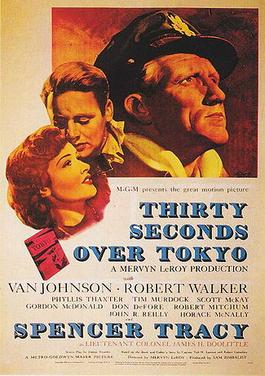
Thirty Seconds Over Tokyo
Thirty Seconds Over Tokyo is a 1944 American war film produced by Metro-Goldwyn-Mayer. The screenplay by Dalton Trumbo is based on the 1943 book of the same name by Captain Ted W. Lawson. Lawson was a pilot on the historic Doolittle Raid, America's first retaliatory air strike against Japan, four months after the December 7, 1941, Japanese attack on Pearl Harbor. The raid was planned, led by, and named after United States Army Air Forces Lieutenant Colonel James Doolittle, who was promoted two ranks, to Brigadier General, the day after the raid.
For the Pere Ubu song, see 30 Seconds Over Tokyo (song).Thirty Seconds Over Tokyo
Thirty Seconds Over Tokyo (1943) by Ted W. Lawson and Robert Considine
Robert Surtees, ASC
Harold Rosson, ASC
- November 15, 1944
138 minutes
United States
English
$2.9 million[2]
Sam Zimbalist was the film's producer and Mervyn LeRoy directed. The picture stars Van Johnson as Lawson; Phyllis Thaxter as his wife, Ellen; Robert Walker as Corporal David Thatcher; Robert Mitchum as Lieutenant Bob Gray; and Spencer Tracy as Lieutenant Colonel—and soon General— Jimmy Doolittle.
Tracy's appearance in the film is more in the nature of a guest star; he receives special billing rather than his usual top billing and has considerably less screen time than star Van Johnson.
In the book, Lawson gives an eyewitness account of the intensive training, the mission, and the aftermath as experienced by his crew and by others who flew the mission on April 18, 1942. Lawson piloted "The Ruptured Duck", the seventh of 16 B-25s to take off from the aircraft carrier USS Hornet. The film depicted the raid accurately and used actual wartime footage of the bombers.
Plot[edit]
Not long after the Pearl Harbor attack, United States Army Air Forces Lieutenant Colonel James Doolittle orders 24 North American B-25 Mitchell medium bombers—with volunteer crews—to report to Eglin Field, Florida, for a secret three-month-long mission. They arrive on March 1. Among them is the craft piloted by Ted Lawson. His crew consists of Lt. Dean Davenport, co-pilot; Lt. Charles McClure, navigator, Lt. Bob Clever, bombardier, and Corporal David Thatcher, gunner-mechanic.
Doolittle warns them: This work is top-secret. He offers them the chance to opt out, particularly if they have wives and families. Lawson's wife, Ellen, drives to Eglin Field to join him. She is pregnant. They are very much in love, but giving up never occurs to them.
The intensive training includes learning how to take off on a runway only 500 feet long as taught by an instructor Naval Aviator from nearby Pensacola Naval Air Station.[4] They are not told why, and those who guess keep quiet. Lawson's plane acquires the nickname "Ruptured Duck" and nose art to match. One dark morning, Lieutenant Colonel Doolittle sends them off to fly cross-country at hedge-hopping height to Naval Air Station Alameda, California. The planes are immediately loaded aboard the aircraft carrier USS Hornet.
At last, Doolittle reveals the mission: Bomb Tokyo, Yokohama, Osaka, Kobe and Nagoya. The carrier will get them within 400 miles of mainland Japan. After dropping their payloads, they will continue to designated landing spots in parts of China controlled by Nationalist forces and regroup in Chungking.
The call to battle stations comes twice daily, at dawn and dusk, when the enemy "pig boats" (submarines) come up. When an enemy surface vessel does discover the convoy, the crews assemble to take off immediately—12 hours earlier than planned. It will be daylight over Japan and night when they reach China. Doolittle leads the raid, dropping incendiary bombs to mark key targets. The Ruptured Duck is the seventh flight. Flying low over the ocean and into Tokyo, through the smoke of burning targets, dropping their bombs as planned. Flak bursts around them, but fighters ignore them.
Lawson crashes in the surf while trying to land on a beach in darkness and heavy rain. Everyone but Thatcher is badly injured. Lawson's left leg is laid open to the bone, and McClure's shoulders are broken. Friendly Chinese help them, and the Americans face hardships and danger while being escorted through Japanese-held territory. In the absence of any medical supplies, the injured men endure terrible pain, and Lawson's leg becomes infected. He dreams of Ellen.
There is a Red Cross banner in the village of XingMing. Doctor Chung arrives with good news and bad. He will take them to his father's hospital, some 19 miles farther. The bad news is that the Japanese have captured an American crew. Hurrying into the hills, they look back: XingMing is burning.
There is no surgeon at the elder Dr. Chung's hospital, but Lt. Smith's crew is on its way with Lt. "Doc" White, who volunteered as gunner. The Japanese approach, and the able-bodied Americans leave, except for Doc. He takes Lawson's leg off well above the knee, using the single dose of spinal anesthesia in their possession. It wears off too soon. Lawson passes out and dreams of Ellen.
A chorus of Scouts singing "The Star-Spangled Banner", in Mandarin, celebrate Lawson's first day out of bed. His forehead shows a tracery of scars. When Dr. Chung senior gives Lawson an heirloom bracelet for his wife, Lawson is puzzled. He does not remember talking about her. When he totters on his crutches, he becomes distraught at the idea of Ellen seeing him like this. They hurry to Ch'ang Chou to rendezvous with an American plane that takes them home.
Doolittle visits Lawson in the hospital and tells him he has work for him to do. When Ellen comes in, Lawson, overjoyed, forgets his missing leg and stands. He falls and they embrace on the floor, all smiles.
Cast notes
Informational notes
Citations
Bibliography